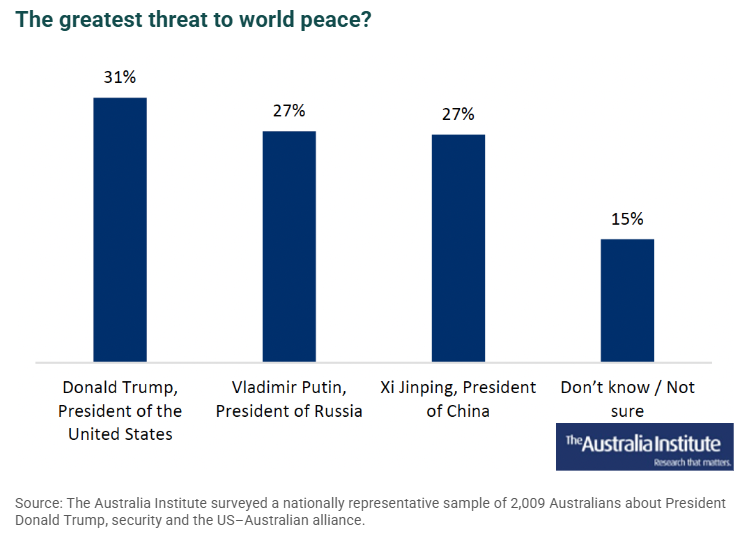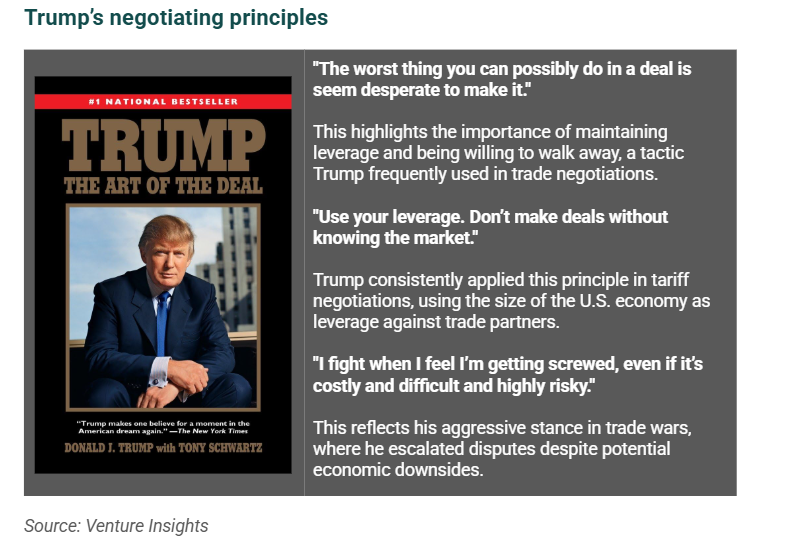REPORT: Australia’s Response to U.S. Transactional Trade Strategies
- Publisher : Venture Insights
- Publish Date : March 28, 2025

Abstract: The U.S. has adopted an increasingly transactional approach to trade and diplomacy, leveraging tariffs, regulatory pressure, and unpredictable policy shifts to extract short-term gains.
This report analyses the implications of this approach for Australia and proposes a set of firm counterstrategies, including targeted taxation the advertising, intellectual property (IP) and license revenue of global digital platforms. By maintaining a strong diplomatic stance and engaging with international partners, Australia can safeguard its economic and strategic interests while ensuring a balanced and sustainable trade relationship with the U.S..
Why This Matters to Telco, IT and Media
The current shift in U.S. trade policy presents a rare opportunity for Australia’s telecommunications, media, and technology (TMT) sector to reshape its approach to digital imports.
For years, U.S. tech giants have benefited from low or no taxation on digital services in Australia, but with the U.S. adopting an increasingly aggressive trade stance, counterclaims for fairer tax treatment become more politically viable. As American protectionism escalates, Australia has a stronger case for adjusting its policies on digital service imports, ensuring that global tech firms contribute equitably to the local economy.
At the same time, Australian public sentiment toward the U.S. is shifting, making it politically easier for the government to take a firmer stance. With more Australians favoring a more independent foreign policy, there is growing support for policies that reduce reliance on the U.S. and prioritize local economic interests. This moment offers the TMT sector a strategic window to push for regulatory and tax reforms, bringing the treatment of digital imports in line with traditional industries.
Australia’s Shift: From Steady Ally to Strategic Player
For over 70 years, Australia has maintained a highly consistent and predictable approach in its relationship with the U.S., built on deep trust and strategic alliance. However, the emergence of Trump’s bolder, more transactional approach to trade and diplomacy has fractured this trust, exposing Australia’s concentration risk in its reliance on the U.S. market. In response, Australia must adopt a more assertive stance, actively diversifying its trade partnerships and reducing economic dependence on a single ally. As Trump himself has demonstrated, having viable alternatives is key to maintaining negotiating strength. This means stepping forward—not standing back—by engaging in a more strategic and bold approach, just as key allies like Canada, the UK, and France have swiftly done in response to shifting U.S. policies.
Shifting Public Sentiment: Australia’s Growing Skepticism Toward the U.S.
Recent findings from The Australia Institute highlight a significant shift in Australian public opinion regarding the U.S.–Australia alliance under President Donald Trump. A survey of 2,009 Australians reveals deep concerns about Trump’s impact on global stability and Australia’s security. Thirty-one percent of Australians view Trump as the greatest threat to world peace, surpassing both Vladimir Putin (27%) and Xi Jinping (27%). This perception is particularly pronounced among women, with 56% feeling less secure in Australia since Trump’s election, compared to just 13% who feel more secure. Additionally, more Australians prefer a more independent foreign policy (44%) over a closer alliance with the U.S. (35%), reflecting growing unease about reliance on an increasingly unpredictable ally. Confidence in U.S. support is also wavering—nearly half (48%) of Australians do not believe Trump would defend Australia’s interests if the country were threatened, while only 16% are very confident he would. Overall, 51% of Australians believe Trump’s election has been bad for the world, double the number who see it as a positive development (25%). These findings suggest that Australia must rethink its strategic positioning and trade relationships in response to shifting public sentiment and the evolving U.S. foreign policy landscape.

Predictable Unpredictability: The Method Behind the Chaos
While Trump’s negotiation tactics often appear erratic, they follow a clear and consistent playbook rooted in The Art of the Deal. His approach relies on leverage, brinkmanship, and the perception of unpredictability to force opponents into concessions. Once understood, his strategies become highly predictable. The following quotes from his book illustrate the guiding principles behind his trade and tariff decisions:

Applying The Art of the Deal to Tariffs
Donald Trump’s approach to tariffs and trade negotiations closely mirrors the principles outlined in his book The Art of the Deal. His strategy is built on leverage, unpredictability, and aggressive positioning to maximize perceived gains. By imposing tariffs, threatening walkaways, and framing negotiations as zero-sum battles, Trump has sought to force trading partners into concessions. The table below highlights how his core negotiation strategies have been applied to U.S. trade policy, particularly in tariff disputes.

Australia’s Positioning in a Transactional Environment
To mitigate the risks posed by the U.S.’s unpredictable trade tactics, Australia must adopt a proactive strategy that balances economic resilience with diplomatic leverage. This includes:
- targeted taxation on U.S.-based platforms that now dominate our advertising and intellectual property markets
- diversifying trade partnerships
- strengthening alliances with like-minded nations
- implementing selective regulatory measures to protect key industries.
These approaches will ensure that Australia maintains its economic sovereignty while minimizing exposure to external trade pressures.

The US’ Current Approach and Key Considerations for Australia
The US approach has many potential risks and possible considerations for Australia to consider.
About Venture Insights
Venture Insights is an independent company providing research services to companies across the media, telco and tech sectors in Australia, New Zealand, and Europe.
For more information go to ventureinsights.com.au or contact us at contact@ventureinsights.com.au.

